Both West Texas Intermediate and Brent benchmarks fell on Monday, snapping two days of gains, as an unexpected sharp decline in Chinese exports in February spurred fears the worlds second largest oil consumer may miss its growth target. Losses however were limited by supply concerns arising from the crisis in Ukraine and civil tension in Libya, as well as upbeat employment data from the US which boosted the top oil consumers economic outlook.
On the New York Mercantile Exchange, WTI crude for delivery in April fell by 1.19% to $101.36 per barrel by 7:54 GMT. Prices held in a daily range between $101.05 and $102.82 per barrel. The US benchmark rose by 1% on Friday but settled the week 1 cent lower, the first weekly decline in eight.
Meanwhile on the ICE, Brent futures for settlement in the same month slid by 0.83% to $108.10 a barrel and shifted between days high and low of $107.75 and $108.85 a barrel. The European benchmark added 0.8% on Friday but settled the week 0.3% lower after it lost 0.6% in the previous five-day period. Brent traded at a premium of $6.74 to its US counterpart, up from Fridays close at $6.36.
Oil prices retreated on Monday after unexpectedly downbeat data from China over the weekend stoked demand concerns from the worlds second biggest economy and oil consumer as economists feared China might miss its growth target.
Chinas National Bureau of Statistics reported on Saturday that the Asian nations exports surprisingly contracted by 18.1% in February on an annual basis, confounding analysts expectations for a 6.8% expansion following Januarys 10.6% growth. Exports slid by 1.6% for the first two months combined from a year earlier, while they marked a 7.9% full-year rise in 2013. This raised concerns that last months poor performance was not solely based on on the Lunar New Year holiday, which began on January 31st.
Meanwhile, Chinas imports rose by 10.1% in February, an inch above Januarys 10% expansion and beating projections for an 8.0% jump. This led to the Asian economys first trade deficit since March 2013 and largest such since February 2012.
A separate report released on Sunday by the National Bureau of Statistics showed that consumer prices rose much slower than expected in February. Consumer inflation jumped by 0.5% last month, trailing analysts’expectations for a slowdown to 0.8% from the preceding month’s 1% advance. Year-on-year, China’s CPI registered at 2.0% growth and matched expectations, but trailed the previous month’s 2.5% advance.
Producer inflation decelerated by 2.0%, underperforming anticipations for posting at -1.9% following the previous month’s 1.6% contraction.
China’s manufacturing activity plunged to an eight-month low in February, data by the National Bureau of Statistics showed, with its Purchasing Managers’ Index falling to 50.2 from January’s reading of 50.5. A separate private survey by HSBC matched expectations for a rebound to 48.5 from January’s 48.3, which was the poorest performance since July.
The weak data points fueled speculations that China might not be able to fulfill its growth expectations this year after Premier Li Keqiang said at the annual meeting of the National People’s Congress last week that the Asian economy’s growth target for 2014 remains unchanged from the previous year at 7.5%, while consumer inflation should be reined at about 3.5%.
The overall negative economic sentiment couldnt be offset even as Chinas crude oil imports jumped by 11.5% from a year earlier in January and February combined to 51.21 million tons. The Asian nation purchased 23.05 million tons last month, down 18% from Januarys record high.
Ukraine, Libya
The oil market however continued to draw support amid supply worries from Ukraine and Libya. Russian forces seized another border post and a military airfield in the Crimea region, tightening their grip. Germanys Chancellor Angela Merkel said that the upcoming Moscow-backed referendum that would decide the regions national belonging was illegal.
President Barack Obama authorized last week financial sanctions against Russia, while the European Union ceased visa and trade talks and warned of possible economic measures.
In response, Russia said that any US sanctions against Moscow over the conflict in Ukraine will boomerang back on the US. Russia’s Foreign Minister Sergei Lavrov held a telephone conversation with his US counterpart John Kerry discussing “hasty and reckless steps” that could harm Russian-American relations.”
Meanwhile in Libya, nationwide output remained at a fraction of its capacity as the 340 000-bpd El Sharara oilfield remained blocked by protesters. Libya’s defense minister held talks last week with the people blocking it, but there was no news whether it will reopen soon. The country currently produces around 230 000 bpd, down from 1.4 million in July.
Fanning additional civil unrest fears, the government threatened on Saturday to bomb a North Korean-flagged tanker, if it attempted to load oil from a rebel-controlled port.
US outlook
Oil prices were also underpinned after better-than-expected job growth in the US in February boosted its economy’s outlook. The Labor Department reported that US employers added 175 000 jobs in February, exceeding analysts’ forecasts for a moderate jump to 149 000. Moreover, January’s reading was revised up to 129 000 from initially estimated at 113 000.
Meanwhile, the US unemployment rate rose to 6.7%, trailing expectations to remain flat at 6.6%, as more people entered the labor force seeking work, but only few were able to find such, the department’s survey of households showed.
Average Hourly Earnings jumped by 0.4%, beating both forecasts and January’s reading of 0.2% growth.





